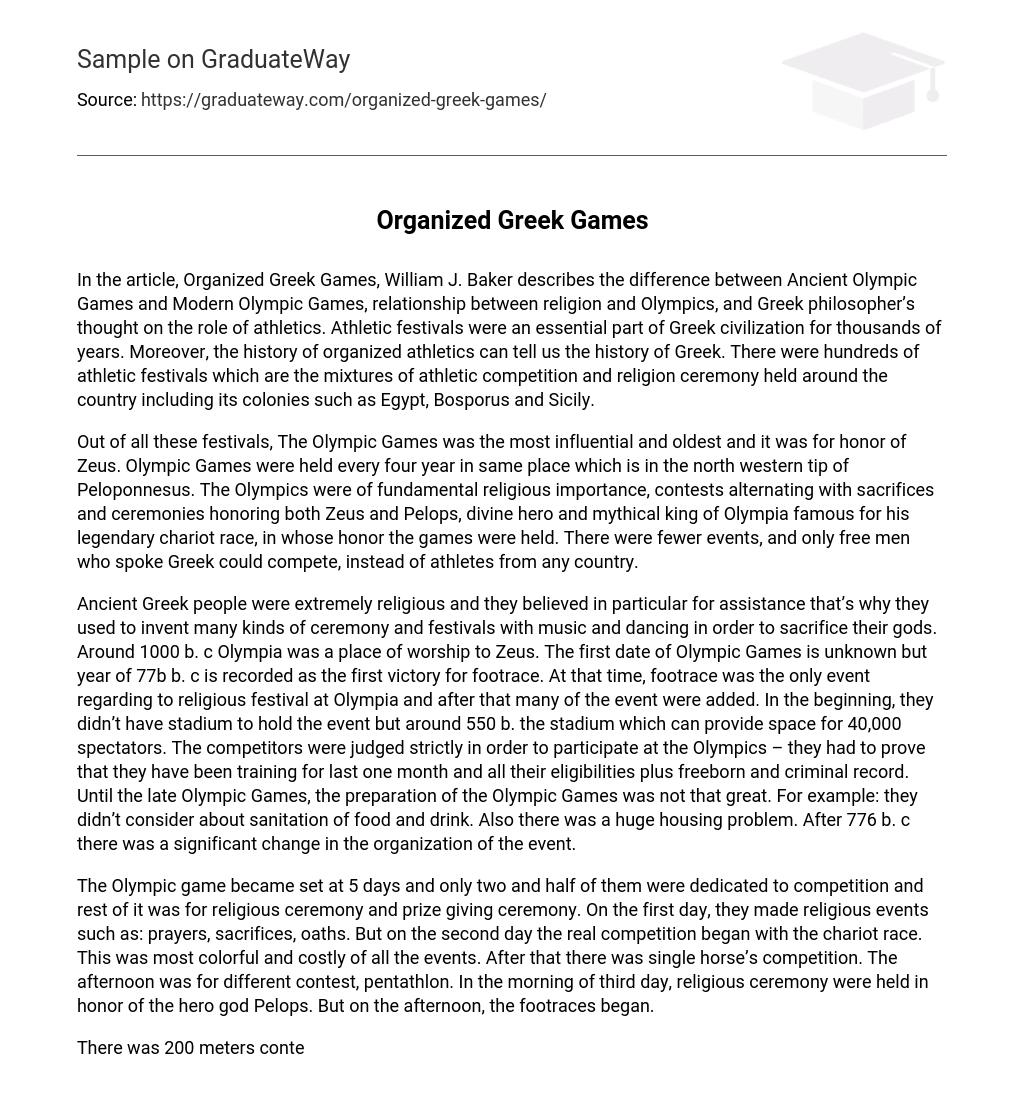In his article “Organized Greek Games,” William J. Baker explores the differences between the Ancient Olympic Games and the Modern Olympic Games, the connection between religion and the Olympics, and the viewpoints of Greek philosophers regarding the importance of athletics. These athletic festivals were a vital part of Greek society for many centuries and provide valuable insights into Greece’s history. The nation hosted numerous athletic festivals that merged competitive sports with religious rituals, occurring not only within its own borders but also in its colonies like Egypt, Bosporus, and Sicily.
The Olympic Games, which honored Zeus, were the oldest and most influential out of all these festivals. They were held every four years in the same location in the northwestern tip of Peloponnesus. The Olympics held fundamental religious significance, with contests alternating with sacrifices and ceremonies to honor Zeus and Pelops. Pelops, a divine hero and legendary king of Olympia known for his chariot race, was the reason for the games. Only free Greek-speaking men were allowed to compete, making it exclusive to athletes from Greece rather than any country.
The Ancient Greek people were deeply religious, relying on various ceremonies and festivals with music and dancing to seek aid from their gods. One such sacred location was Olympia, dedicated to Zeus since approximately 1000 b.c. The exact date of the first Olympic Games is uncertain, but the year 77 b.c. marks the first recorded victory in the footrace event, which was initially the sole competition held during the religious festival at Olympia. Subsequently, numerous other events were incorporated.
Initially, there was no stadium to host the event. However, around 550 b. a stadium was built that could accommodate 40,000 spectators. Strict judgment was placed upon competitors to qualify for the Olympics. They had to demonstrate a month of training, meet all eligibility requirements, and have a clean criminal record as well as being freeborn. The organization and preparation of the Olympic Games were not optimal until the later games. For instance, they overlooked issues such as sanitation of food and drink and faced housing shortages. It wasn’t until 776 b. c that there were significant changes in the event’s organization.
The Olympic games lasted for 5 days, with 2 and a half days dedicated to competition and the remaining time for religious and prize giving ceremonies. The first day consisted of religious events including prayers, sacrifices, and oaths. The second day marked the start of the actual competition with the chariot race, which was the most impressive and expensive event. Following that was a horse competition, followed by the pentathlon in the afternoon. The third day began with a religious ceremony honoring the god Pelops, followed by footraces in the afternoon.
The Olympic Games featured various running events: a 200-meter race, a 400-meter race, and a longer distance race spanning 4,800 meters. On the fourth day of the Games, intense and fierce competitions took place, including boxing, pancration (a kind of mixed martial art), wrestling, and armored footraces. The first three contests showcased sheer strength and determination, making them aggressive and brutal. These events had few regulations, with no ring or time constraints. Additionally, there were no restrictions on weight, allowing the toughest and most muscular individuals to participate. Compared to boxing, wrestling was relatively less violent as it had some rules in place, such as prohibiting biting and gouging.
In boxing, there was no break in timing until one competitor was knocked out or exhausted. The focus of the competitors was on the opponent’s face rather than their body. The Pancration sport posed an even greater challenge as competitors could use any means necessary to win. After these brutal contests, a 400-meter armored footrace took place on the final day of the Olympics to award all prizes. Swimming, diving, rowing, sailing, and ball games were not included in the ancient Olympic Games.
The reason why there is no ball game in the Olympics is because it was originally intended for women, children, and elderly men rather than professional athletes. When the Olympics became a major event, it maintained its traditional format. Additionally, women were not allowed to watch or take part in the Ancient Games, which meant they had no significant involvement. This prohibition was due to Olympia’s sacred status as a domain exclusively dedicated to Zeus and reserved for males.
The chariot races, which began in later games, took place outside the sacred precinct and were open to women spectators. Women also celebrated their own festival in honor of Hera. The victor of the Olympic Games did not receive any monetary reward or other prize, participating solely for the esteemed victory. Additionally, during the first few centuries of Olympic history, the majority of competitors were affluent individuals who could afford coaches, trainers, and a proper diet.
Greek philosophers did not place significant emphasis on the professionalism of athletes, and there was little criticism surrounding athletics. The most widespread critique of Greek athletics pertained to the prioritization of physical strength over spiritual and mental values. Additionally, philosopher Aristotle expressed concern over the brutality of certain Olympic games, suggesting that individuals should possess a balance between weakness and the physical condition of an athlete. Despite this, many esteemed philosophers still recognized the close connection between the body and mind in athletics.





